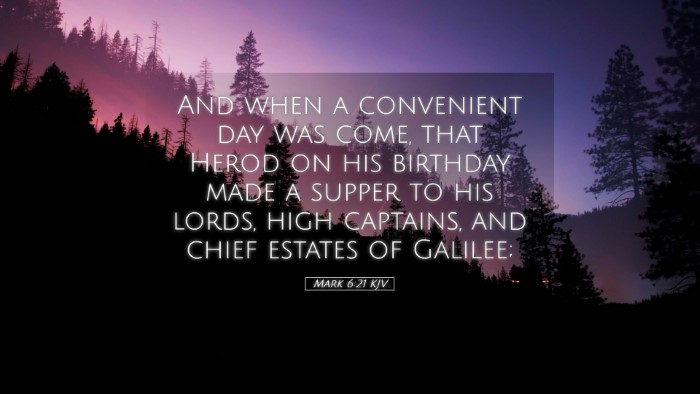Commentary on Mark 6:21
Text: "And when a convenient day was come, that Herod on his birthday made a supper to his lords, high captains, and chief estates of Galilee."
Introduction
This verse marks a pivotal moment in the narrative of Mark's Gospel, reflecting on Herod's character and the perilous events that lead to John the Baptist's execution. The passage invites exploration of themes such as power, manipulation, and the moral complexities faced by individuals in authority.
Context and Background
The background of Mark 6:21 involves the political climate of Herod Antipas, the ruler of Galilee. His character is critical to understanding the implications of this event. In this instance, we note that the “convenient day” signifies how human affairs are often marked by occasions that lead to consequential actions. Matthew Henry, in his commentary, emphasizes how this auspicious day aligns with Herod's desire to showcase his power.
Herod's Character
Herod is portrayed as a complex figure—both a ruler and a puppet under Roman authority. Albert Barnes profiles Herod as a man torn between personal indulgences and political maneuvering. His public celebration is not only about personal delight; it also serves to affirm his status among influential figures.
Significance of the Occasion
The birthday banquet, a display of opulence and power, serves as an important cultural backdrop for understanding motivations. Adam Clarke observes how such feasts were avenues for establishing and solidifying authority among the elite. The presence of "lords, high captains, and chief estates" underscores Herod's attempt to secure loyalty and admiration from his circle.
Analysis of the Phrase "Convenient Day"
The term "convenient day" is noteworthy; it unveils how easily moments of personal celebration can turn into tragedy. Matthew Henry notes that the timing highlights the intersections of personal pleasure and the will of God, suggesting a divine orchestration even in Herod's seemingly autonomous choices.
God's Sovereignty
Even amid Herod's revelry, it is a reminder that God's sovereign plan persists. This is a theme that recurs through scripture, where human decisions coalesce with divine timing. Thus, the “convenient day” serves as a profound reminder for believers of the need for discernment in celebrating success, as it may carry weighty moral implications.
The Banquet’s Implications
The grandeur of Herod’s birthday feast has far-reaching consequences. Beyond mere celebration, it evolves into a stage for manipulation and morally reprehensible decisions. Clarke emphasizes that the spectacle of the banquet foreshadows the tragic turn of events that will deeply impact not only Herod but also John the Baptist, the prophet whose voice is silenced due to the actions taken during this time.
Symbolism of the Supper
Banquets in the Bible often symbolize fellowship, covenant, and, at times, betrayal. Herod's feast can be viewed as a juxtaposition of earthly enjoyment versus the ethical duties of a sovereign leader. Barnes notes that Herod, amidst laughter and joy, remains oblivious to the prophetic urgency calling for righteousness and justice.
Lessons for Leadership
For pastors, theologians, and students alike, Mark 6:21 serves as a cautionary tale about leadership responsibilities. The event demonstrates how personal choices influence broader societal outcomes. A leader’s influence can wield great power, either towards righteousness or towards destruction, raising the question: What values do we uphold when faced with the temptation of convenience and self-indulgence?
- Leadership Integrity: The narrative encourages leaders to act with moral firmness, as the ease with which Herod is swayed demonstrates the peril of placing personal desire above principle.
- Awareness of Consequences: Understanding the wider impact of actions taken in seemingly private celebrations reinforces the need for discernment.
- The Role of Influence: This passage encourages reflection on how influence and authority can shape outcomes in ways that align with or diverge from divine will.
Conclusion
Mark 6:21 stands as a reminder of the intricate connection between personal choices and broader ethical obligations. The actions that unfold from Herod’s thoughtfully chosen day reveal the dangerous intersections of power and morality. As we reflect on this passage, may we gain insight into fair leadership, the weight of influence, and the continued relevance of prophetic voices in a world that often prioritizes convenience over righteousness.


